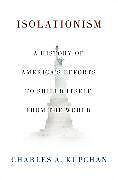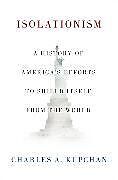Isolationism
Einband:
Fester Einband
EAN:
9780199393022
Untertitel:
A History of America's Efforts to Shield Itself from the World
Genre:
Politikwissenschaft
Autor:
Charles A Kupchan
Herausgeber:
Oxford University Press, USA
Anzahl Seiten:
464
Erscheinungsdatum:
01.10.2020
ISBN:
978-0-19-939302-2
Taken in all, Kupchan has produced a first-rate account. The style is readable, the research thorough, manifesting a superior mastery of primary sources and the scholarly literature. By and large, Kupchan's treatment is masterful, essential reading for policymakers and a public that is prone to cliché thinking. Professors of American diplomatic history would do well to assign this work; at the very least, they should update their lecture notes. Hopefully, this work will force Americans to leave the world of polemics for that of reflection and responsible analysis.
Autorentext
Dr. Charles A. Kupchan is Professor of International Affairs at Georgetown University and Senior Fellow at the Council on Foreign Relations. From 2014-2017 Kupchan served as Special Assistant to the President and Senior Director for European Affairs on the National Security Council in the Obama White House. He was Director for European Affairs on the NSC during the first Clinton administration. Prior, he worked in the U.S. Department of State on the Policy Planning Staff. Kupchan has served as a visiting scholar at Harvard University's Center for International Affairs, Columbia University's Institute for War and Peace Studies, and other renowned institutions. He was a Henry A. Kissinger Scholar at the Library of Congress, a Fellow at the Woodrow Wilson International Center for Scholars, a Senior Fellow at the Transatlantic Academy, and a recipient of the Hubert H. Humphrey Award for notable public service by a political scientist.
Klappentext
This is the first book to examine the full arc of American isolationism, from the founding era through the Trump presidency. Charles Kupchan tells the fascinating story of why isolationism dominated US statecraft for so long, uncovers isolationism's enduring connection to American exceptionalism, and explains why an aversion to foreign entanglement is making a comeback. This fresh account of American history sheds revealing light on not only the nation's past, but also where US grand strategy is headed and how the nation can find the middle ground between isolationism and strategic overreach.
Zusammenfassung
The first book to tell the full story of American isolationism, from the founding era through the Trump presidency. In his Farewell Address of 1796, President George Washington admonished the young nation "to steer clear of permanent alliances with any portion of the foreign world." Isolationism thereafter became one of the most influential political trends in American history. From the founding era until the Japanese attack on Pearl Harbor, the United States shunned strategic commitments abroad, making only brief detours during the Spanish-American War and World War I. Amid World War II and the Cold War, Americans abandoned isolationism; they tried to run the world rather than run away from it. But isolationism is making a comeback as Americans tire of foreign entanglement. In this definitive and magisterial analysis-the first book to tell the fascinating story of isolationism across the arc of American history-Charles Kupchan explores the enduring connection between the isolationist impulse and the American experience. He also refurbishes isolationism's reputation, arguing that it constituted dangerous delusion during the 1930s, but afforded the nation clear strategic advantages during its ascent. Kupchan traces isolationism's staying power to the ideology of American exceptionalism. Strategic detachment from the outside world was to protect the nation's unique experiment in liberty, which America would then share with others through the power of example. Since 1941, the United States has taken a much more interventionist approach to changing the world. But it has overreached, prompting Americans to rediscover the allure of nonentanglement and an America First foreign policy. The United States is hardly destined to return to isolationism, yet a strategic pullback is inevitable. Americans now need to find the middle ground between doing too much and doing too little.
Inhalt
Preface
1. American Isolationism: Past as Prelude?
2. An Anatomy of Isolationism
Part I - The Era of Isolationism, 1789-1898
3. The Revolutionary Era: Contemplating Nonentanglement
4. From the French Revolution to the War of 1812: Isolationism as Doctrine
5. Westward Expansion and the Monroe Doctrine: The Limits of Hemispheric Ambition
6. The Civil War, Reconstruction, and the Rise of American Power: Restraint Amid Ascent
Part II - The Defeat of Realist and Idealist Internationalism, 1898-1941
7. The Spanish-American War and the Onset of Imperial Ambition
8. Republican Imperialism and the Isolationist Backlash
9. Wilsonian Idealism and the Isolationist Backlash
10. The 1920s: Influence without Responsibility
11. From the Great Depression to Pearl Harbor: Delusions of Strategic Immunity
Part III - The Rise and Fall of Liberal Internationalism, 1941-2020
12. World War II and the Cold War: The Era of Liberal Internationalism
13. The End of the Cold War, Overreach, and the Isolationist Comeback
14. Between Isolationism and Liberal Internationalism: The Search for a Middle Ground

Leider konnten wir für diesen Artikel keine Preise ermitteln ...
billigbuch.ch sucht jetzt für Sie die besten Angebote ...
Die aktuellen Verkaufspreise von 6 Onlineshops werden in Realtime abgefragt.
Sie können das gewünschte Produkt anschliessend direkt beim Anbieter Ihrer Wahl bestellen.
Loading...
Die aktuellen Verkaufspreise von 6 Onlineshops werden in Realtime abgefragt.
Sie können das gewünschte Produkt anschliessend direkt beim Anbieter Ihrer Wahl bestellen.
| # | Onlineshop | Preis CHF | Versand CHF | Total CHF | ||
|---|---|---|---|---|---|---|
| 1 | Seller | 0.00 | 0.00 | 0.00 |
